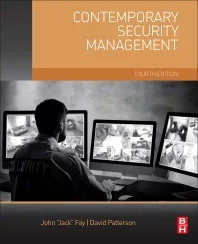Access control, customer service among top security guard responsibilities

The International Foundation for Protection Officers (IFPO) has released the findings of their research project, "The Competence of Frontline Security Professionals and What They Say About Their Work." The project analyzed survey responses from over 10,600 security officers and guards across nine countries, exploring the perceptions respondents have of their responsibilities, experiences and career overall.
Where security guards work
According to the report, 39% of security officers work in-house, followed by 35% working as contract guards. Seventeen percent of respondents indicated that they were self-employed. The respondents reported a pretty even split between many sectors: the top three sectors where security officers work are banking/financial services (11%), colleges/universities (9%) and government services (7%).
When asked to list their highest level of education, 33% selected trade/technical/vocational training, followed by 28% having completed high/secondary school and 24% earning an undergraduate degree. Sixty-six percent of respondents were between the ages of 26 and 45, and just over one quarter of the security officers surveyed reported being age 46 or above. When it comes to gender representation, 76% of security guards were male, 22% were female and 2% of respondents selected "Other," which may encompass those with nonbinary gender identities.
The roles of a frontline security professional
People who work on the frontlines of security have many job titles and roles in the industry. The majority (65%) of respondents reported their job titles as uniformed security guard, officer or supervisor, while 19% are door security and 10% worked in surveillance and emergency notification as CCTV operators, central station alarm respondents or surveillance specialists.
Security officers reported wearing many hats when it comes to their jobs. As frontline security workers, respondents were asked to rank the frequency they completed certain tasks. The task most often reported as a core responsibility was access control (54%), followed by physical patrols/surveillance (48%). Forty-four percent of respondents noted that customer service was a core task at their job.
Read the IFPO report to dive deeper into these findings and review more data about frontline security officers.
Looking for a reprint of this article?
From high-res PDFs to custom plaques, order your copy today!







